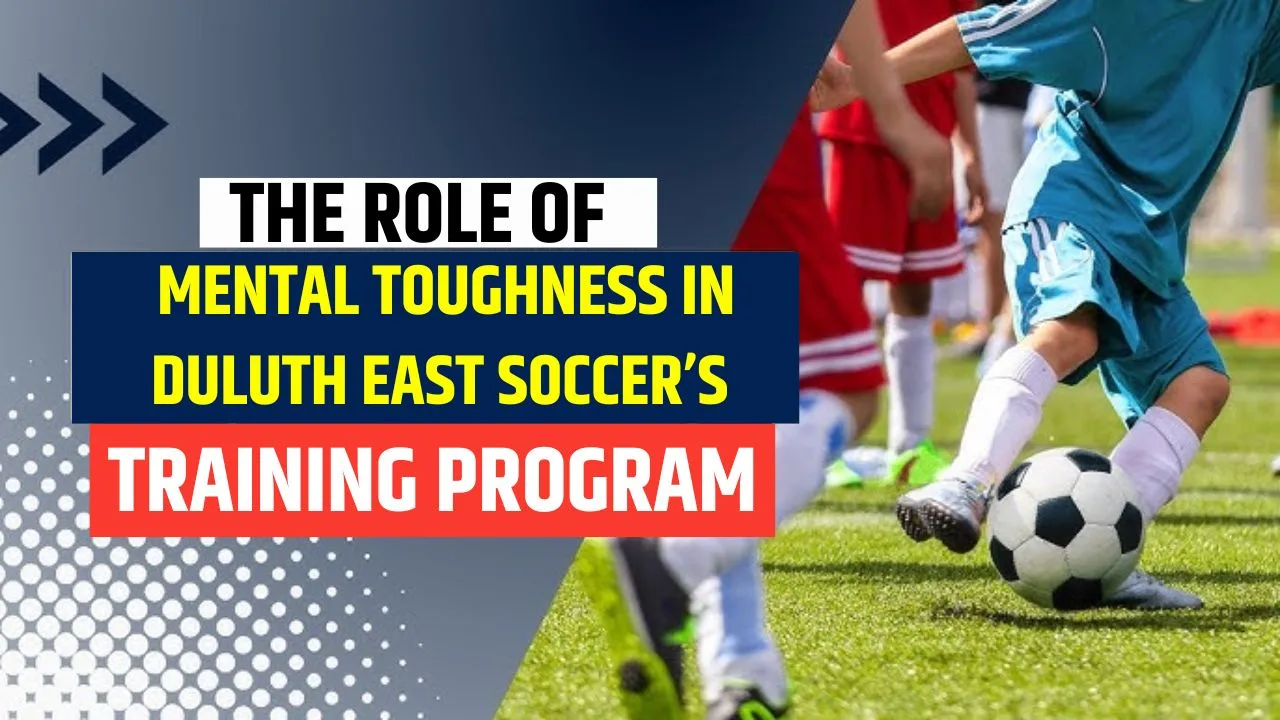Mental toughness in Duluth East Soccer plays a central role in shaping a team that doesn’t just compete—but thrives—under pressure. At every level of soccer, from local matches to championship games, it’s not only the physically strong who excel. It’s the players who can think clearly, stay calm, and push through adversity who stand out the most. For Duluth East, developing that inner strength is as important as fitness and tactical preparation.
This article dives deep into how Duluth East has built a culture that champions mental toughness as a critical part of player development. From training field habits to match-day mentality, we’ll explore how their coaching philosophy integrates emotional control, mental focus, and competitive confidence into everyday sessions. We’ll also highlight how these mental tools give Duluth East athletes a real edge—on the field and beyond.
Mental Toughness in Duluth East Soccer
At Duluth East, mental toughness is not an optional skill—it’s a foundation. The coaching staff recognizes that technical and physical training alone can’t guarantee high performance in competitive environments. By focusing on psychological strength, they help players build resilience, enhance concentration, and control emotions under stress. This focus keyword represents not only a training approach but also a mindset that is embedded into every corner of the program. In this section, we’ll walk through how Duluth East trains the mind to match the muscle, building young athletes who are not only talented but mentally prepared for any challenge.
Overview Table: Key Components of Mental Training at Duluth East
| Mental Training Component | Purpose | How It’s Applied |
| Visualization Techniques | Boost confidence and mental preparation | Regular pre-game and post-practice exercises |
| Breathing & Focus Drills | Reduce anxiety and sharpen awareness | Integrated into warm-ups and cool-downs |
| Positive Self-talk | Replace fear with encouragement | Coached during high-pressure drills |
| Team Bonding | Build emotional support and group strength | Weekly team-building activities |
| Controlled Stress Drills | Simulate game-time stress for resilience | Designed during tactical sessions |
Why Mental Toughness Matters in Soccer
In modern soccer, the margin between winning and losing often comes down to decision-making under pressure. Duluth East coaches understand this better than most. Mental toughness in Duluth East Soccer is about teaching players how to manage emotional spikes, stay locked in during high-stakes moments, and carry out game plans regardless of the scoreboard.
You can have top-tier dribbling skills and impressive speed, but if you crumble after a bad call or lose focus in the final minutes, all that talent goes unused. That’s why the program puts serious effort into developing a strong mental core in its athletes—something many other teams overlook. The payoff? Athletes who don’t just react to pressure—they own it.
How Duluth East Trains Mental Toughness
Duluth East coaches have created a program where soccer mindset training is built into the day-to-day structure. It starts with small habits—like setting individual goals before every practice or reflecting after every match. These aren’t just feel-good tasks; they build self-awareness and discipline.
During drills, coaches often replicate game-day stress. For example, a common exercise involves reducing time limits or adding extra defensive pressure, forcing players to think and act quickly. These aren’t just physical challenges—they’re mental workouts designed to simulate what it feels like when the clock is ticking and the crowd is watching.
Breathing exercises are taught as part of the warm-up and cool-down, and players are encouraged to use them during matches to reset mentally. Visualization, a key element of the program, helps players mentally rehearse different scenarios—from taking a penalty shot to defending in a 1v1. Over time, these exercises build players who trust themselves, even under pressure.
Role of Coaches and Team Culture
The coaching philosophy at Duluth East goes beyond tactics and technique. Coaches here act as mental mentors as much as trainers. They know that young players look for guidance in how to process disappointment, handle criticism, and build confidence. So, they teach it actively.
Mistakes are not punished; they’re used as learning moments. If a player has a bad game, coaches take the time to review what happened—focusing not on blame, but on recovery. This teaches players how to bounce back stronger, not fall apart.
The team culture reinforces this. Every player is encouraged to support one another, whether it’s through communication during drills or helping teammates recover from poor performances. This emotional support creates an environment where athletes feel safe enough to take risks and grow, knowing their teammates have their back.
Benefits of Mental Toughness in Match Performance
When players develop sports resilience and mental clarity, they perform better under pressure. Duluth East has seen this pay off in multiple game scenarios—particularly in tight second halves or during tournament play. Mentally tough players make better decisions, stay disciplined, and are less likely to fold in the face of setbacks.
From key moments like last-minute goals to saving penalty kicks, having a calm and focused mind makes the difference. The program produces athletes who don’t just play the game—they manage it. These players stay focused, keep energy levels steady, and lead with poise even in chaotic moments.
In short, mental toughness makes players consistent performers rather than emotional reactors. It’s the difference between getting through a season and owning it.
Real-Life Examples from Duluth East
- Comeback Victories: In recent seasons, Duluth East pulled off multiple comeback wins where players refused to panic despite trailing. Coaches credited their mental discipline and belief in the process.
- Penalty Pressure Moments: During a regional qualifier, Duluth East faced a penalty shootout. Players kept their cool, used breathing techniques, and converted every shot. Goalkeeper saved two with laser-sharp focus.
These moments aren’t just luck—they’re the result of consistent mental training that prepares athletes for when it matters most.
Techniques Used to Build Mental Toughness
- Guided Visualization: Players mentally walk through scenarios before games, helping build confidence and reduce anxiety.
- Controlled Breathing: Simple routines that calm nerves and sharpen awareness during key moments.
- Journaling and Goal Setting: Weekly reflections help players track mental growth and personal targets.
- Focused Drills Under Stress: Coaches create difficult match-like scenarios to build decision-making under pressure.
- Positive Team Language: Teammates and coaches use uplifting talk to build an encouraging and growth-focused culture.
These strategies combine to shape strong, balanced athletes ready for the demands of competitive soccer.
Mental Toughness Off the Field
The skills developed through mental toughness in Duluth East Soccer extend well beyond the pitch. Players report improved focus in school, better time management, and stronger problem-solving in daily life. The ability to remain calm under stress, think critically, and recover from failure are traits that help these young athletes succeed academically and socially.
This is the true value of their program. It doesn’t just create soccer players—it builds future leaders, students, and teammates who are prepared for life’s challenges.
Challenges in Training Mental Toughness
One major hurdle is that mental growth isn’t always visible. Unlike a sprint time or lifting weight, there’s no stopwatch for confidence. Coaches must rely on communication, observation, and trust to assess progress.
Another challenge is patience. Some players take longer to develop emotional control or confidence, and that’s okay. The Duluth East approach accepts this and focuses on long-term development, avoiding the rush for short-term results. This commitment to every athlete’s journey is part of what makes their system so effective.
FAQs
What does mental toughness mean in Duluth East Soccer?
It refers to a player’s ability to stay calm, focused, and resilient under pressure both in games and during training.
How is mental strength developed at Duluth East?
Through visualization, breathing techniques, high-pressure drills, positive coaching, and team support systems.
Why is mindset training important in youth soccer?
Because mental strength helps players perform better in pressure situations, build confidence, and grow through failure.
Do all players get mental training at Duluth East?
Yes, it’s a core part of the program for every athlete, not just top performers.
Is mental toughness something anyone can learn?
Absolutely. With the right environment and consistent practice, every player can grow stronger mentally.
Conclusion
Mental toughness in Duluth East Soccer is not a slogan—it’s a philosophy. It’s the quiet discipline behind every comeback, every confident play, and every calm moment under pressure. It’s the difference between teams that play to win and teams that expect to win because they’re mentally ready for any challenge.
If you’re a young athlete, coach, or parent involved in soccer, there’s a powerful lesson here: the mind is just as trainable as the body. And when both are trained well, the results speak for themselves.
Leave a comment if this inspired you or share it with someone in your soccer circle. For more insights into mindset and soccer performance, explore our related content on athlete development and coaching strategies.











